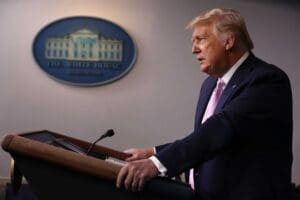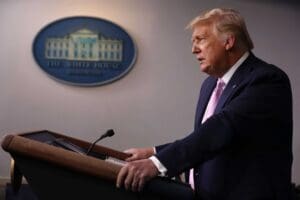
Concerns are mounting that UK businesses could face steeper trade taxes after former US president Donald Trump announced plans to introduce “reciprocal tariffs” that factor in VAT.
Trump has instructed his team to develop a system where tariffs on imports match levies imposed on US goods, potentially affecting trade with the UK. While Britain was previously considered less exposed to tariffs than other nations, the inclusion of VAT in tariff calculations has raised fresh concerns about its impact on British exports.
Analysts suggest that tariffs of 20% or more could be applied to the UK, alongside the European Union. The British Chambers of Commerce (BCC) has warned that key industries—including automotive, pharmaceuticals, and food and drink—could be “significantly hit” by these new measures, announced by the White House on Thursday.
The Trump administration’s latest move broadens the scope of US trade retaliation, targeting not just traditional tariffs but also “unfair or harmful acts, policies, or practices.”
One of Trump’s primary justifications for imposing tariffs has been trade imbalances, where countries sell more to the US than they import. However, both the UK and US claim to have trade surpluses with each other due to differences in data collection methods. The introduction of VAT into the tariff equation adds further uncertainty over how British businesses might be affected.
Trump’s statement described VAT as an “unfair, discriminatory or extraterritorial tax.” The UK’s VAT system applies a standard 20% tax on most goods and services, regardless of whether they are imported or domestically produced.
George Saravelos, global head of FX research at Deutsche Bank, warned that if US tariffs were calculated based on VAT and existing tariffs combined, UK businesses exporting to the US could face duties of 21%.
“If reciprocal tariffs are applied on a VAT basis, European countries would be much higher on the list of impacted nations,” Saravelos said.
William Bain, head of trade policy at the BCC, noted that while the UK had some “insulation” due to exporting fewer goods to the US compared to other nations, the proposed changes would still “create more cost and uncertainty” and “upend established trade norms.”
Paul Ashworth, chief UK economist at Capital Economics, argued that most experts see VAT as a non-discriminatory tax, as it applies equally to domestic and imported goods. However, one of Trump’s advisers has suggested that VAT disadvantages US businesses, as America applies much lower sales taxes at the state level.
Ashworth noted that Trump now appears to favour a country-specific tariff approach, rather than imposing a blanket tax on all US imports.
The potential impact of these proposed tariffs remains uncertain, with legal experts warning that the term “reciprocal” may not mean what many assume.
Caroline Ramsay, partner and head of international trade at law firm TLT, explained: “It does not mean that the USA is going to check what the UK tariff is on paper imports and match that tariff percentage for paper exports to the US from the UK.”
Instead, the US is likely to determine tariffs based on its own interpretation of what constitutes a fair trade policy.
Bain stressed that it is “vital” for the UK government to engage in negotiations with Trump and avoid being “sucked into a trade war of tit-for-tat tariffs.”
Meanwhile, senior UK government minister Pat McFadden urged caution, stating: “The most sensible thing to do with all of these announcements is to digest them, see if they actually come to pass, and then decide what you do.”
As uncertainty looms over the future of UK-US trade relations, businesses across multiple sectors now face the prospect of increased costs and potential disruptions to transatlantic commerce.
Read more:
Trump’s tariff threat: UK businesses could face higher trade taxes

